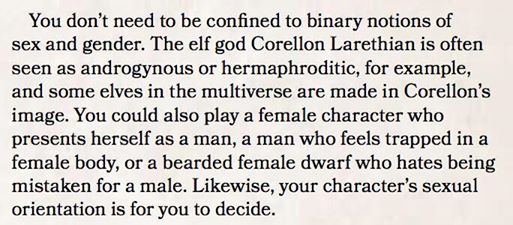Dungeons and Greengrocers
In re a recent article in this space, we note that even corners of our culture which have nothing whatsoever to do with Christianity, or sanity, or sex, or reproduction, or marriage, have now firmly made a public statement to despise and denigrate Christ and kiss the rump of the Antichrist.
Just to remind you of our last episode:
James Wyatt, the designer of the latest Dungeons & Dragons starter set, is trumpeting how progressive the game’s values are:
And what could possibly be more authentically faux medieval than that?
You may be wondering, why in the world would Mr. Wyatt, a game designer, take an obnoxious public stand on an issue where he is in the wrong, he knows he is in the wrong and there is no possibility that even as a joke he regard himself as being in the right. He is saying something absurd, and he knows it, and we know it, and we know he knows it.
So why do it? Why not announce that Dungeon Masters can run worlds where twice two is five, or children are older than their parents? Or some other absurdity equally as stupid?
In this regard, allow me to quote Vaclav Havel.
THE MANAGER of a fruit-and-vegetable shop places in his window, among the onions and carrots, the slogan: “Workers of the world, unite!” Why does he do it? What is he trying to communicate to the world? Is he genuinely enthusiastic about the idea of unity among the workers of the world? Is his enthusiasm so great that he feels an irrepressible impulse to acquaint the public with his ideals? Has he really given more than a moment’s thought to how such a unification might occur and what it would mean?
I think it can safely be assumed that the overwhelming majority of shopkeepers never think about the slogans they put in their windows, nor do they use them to express their real opinions. That poster was delivered to our greengrocer from the enterprise headquarters along with the onions and carrots. He put them all into the window simply because it has been done that way for years, because everyone does it, and because that is the way it has to be. If he were to refuse, there could be trouble. He could be reproached for not having the proper decoration in his window; someone might even accuse him of disloyalty. He does it because these things must be done if one is to get along in life. It is one of the thousands of details that guarantee him a relatively tranquil life “in harmony with society,” as they say.
Obviously the greengrocer is indifferent to the semantic content of the slogan on exhibit; he does not put the slogan in his window from any personal desire to acquaint the public with the ideal it expresses. This, of course, does not mean that his action has no motive or significance at all, or that the slogan communicates nothing to anyone. The slogan is really a sign, and as such it contains a subliminal but very definite message. Verbally, it might be expressed this way: “I, the greengrocer XY, live here and I know what I must do. I behave in the manner expected of me. I can be depended upon and am beyond reproach. I am obedient and therefore I have the right to be left in peace.” This message, of course, has an addressee: it is directed above, to the greengrocer’s superior, and at the same time it is a shield that protects the greengrocer from potential informers. The slogan’s real meaning, therefore, is rooted firmly in the greengrocer’s existence. It reflects his vital interests. But what are those vital interests?

